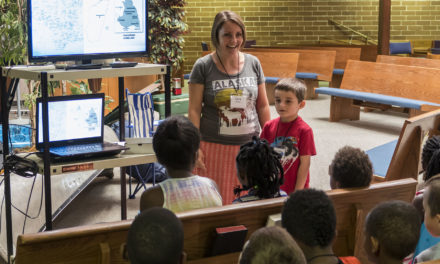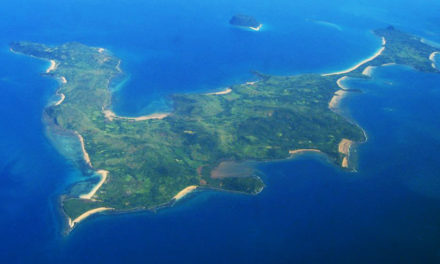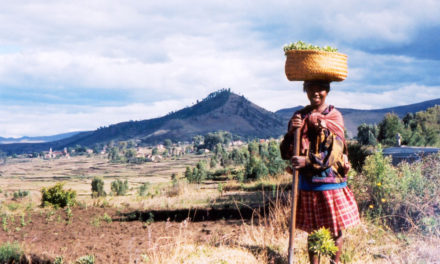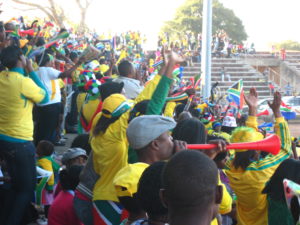 “Laduuuuma!” The crowd went wild! Everyone in their yellow and green (and some also in red and blue and black and white) jumped up and down, screaming, flailing their arms, waving their flags, blowing as hard and as loud as they could on their vuvuzelas. Many were hugging, many more were dancing where they stood. Some ran down to the front and started a running parade that quickly grew in number. One man had brought the back side of a toilet and its attached pipe and did his best to make horn sounds with it. This went on for a good 20 to 30 minutes, regardless of what else was happening. Bafana Bafana, the South African team, had scored the first goal of the World Cup!
“Laduuuuma!” The crowd went wild! Everyone in their yellow and green (and some also in red and blue and black and white) jumped up and down, screaming, flailing their arms, waving their flags, blowing as hard and as loud as they could on their vuvuzelas. Many were hugging, many more were dancing where they stood. Some ran down to the front and started a running parade that quickly grew in number. One man had brought the back side of a toilet and its attached pipe and did his best to make horn sounds with it. This went on for a good 20 to 30 minutes, regardless of what else was happening. Bafana Bafana, the South African team, had scored the first goal of the World Cup!
The kind of atmosphere and excitement here right now is incredible. It builds into a sort of wild fervor when South Africa is playing a game, and boils right over when they score, but even when no team is currently playing, the tingling excitement is nearly tangible. And it’s everywhere. Vuvuzelas (the traditional South African soccer horn) can be heard at all hours of the day or night, even one or two still tooting in the distance here in our remote village at 3 am and 4 am.
This is the first time the World Cup has ever been held anywhere in Africa, though various African teams have regularly competed in the World Cup for quite some time now. As the most widely viewed sporting event in the world, this is BIG news for Africa, and of course, even bigger for South Africa!
The thing is, the African continent is sort of the neglected step-child left over from colonial times. And whether this apparent post-colonial failure is simply because of cultural, environmental, or other factors, the truth is that Africa as a whole is still far behind the rest of the world in most developmental standards. And most people are more or less aware of something like that.
I think a common idea is that Africa is still completely full of people in grass skirts or animal-skin loincloths and with little to no education. And yes, that’s still true in a few of the most remote areas throughout Sub-Saharan Africa, but it’s not widely true. Africa and Africans have a lot to offer, despite any challenges and difficulties throughout the continent. And I think those types of common misconceptions have often prevented people from noticing some of the broader good qualities within Africa, which has further contributed to keeping Africa behind.
So, as I said, the World Cup here in South Africa is HUGE news! The entire time we’ve been here with the Peace Corps (since July 2008), people everywhere have been eagerly expecting this moment. They’ve placed so many hopes on this time and what it can do for their country and their continent. Some people have had fears that the whole proposition would be a failure somewhere along the way. But it’s here now. It’s happening. And I think many of the people’s hopes were well-founded.
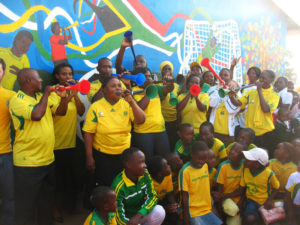
Our school celebrating the opening of the World Cup in front of a soccer-themed mural we painted with the Art Club.
To start with, the World Cup in South Africa gives many people the chance to see Africa in a different light, while watching safely on their TVs on the other side of the world. And of course, there are hundreds of thousands of tourists already here visiting just during the time of the World Cup, and the games aren’t the only thing they’re going to be seeing. No doubt this will provide a permanent boost to tourism, thus boosting the economy, of South Africa and neighboring African countries. If any of you are wondering, South Africa is a really cool place even just for a visit; there’s tons of great stuff to see and do here.
This gives the chance to counterbalance much of the negative media and ideas about Africa that often only focus on starvation, child soldiers, and corrupt politics. And those things are true in some parts of Africa and from time to time, but it’s not the full story here, not even the major story for most Africans in most of Africa.But the World Cup also gives people the chance to rub shoulders with millions of average Africans. Though we don’t currently have access to a TV, I have no doubt that many regular people here are being interviewed about different topics and their responses are being broadcast and printed around the world. And of course, many South Africans are attending the World Cup games in large numbers, and well, they live and work here! Anyone visiting for the World Cup can’t help but meet them. And many Africans are really cool people!
The World Cup also gives the chance to display South Africa’s wide diversity. Not everyone who’s an African is black. Here in South Africa there are many people of European ancestry, of Indian and Malaysian ancestry, and from other places. And they’re all just as much Africans as everyone else, and just as much an important part of life here in South Africa and throughout the continent. Though of course, with South Africa’s wide diversity of ethnic backgrounds (probably the widest on the African continent), comes a history of racism and racial oppression as well as tribalism and tribal oppression. And in South Africa, as I’ve said before, a lot of that is still fresh and impacting daily life here.
And that’s where my biggest hope for the impact of the 2010 World Cup lies: reconciliation. South Africa has come a long way throughout the decades and even just in the short 16 years since legislated racism here has ended. But the effects of the past are still very much in the present and South Africa still has quite a way to go. Divisions based on past racial and ethnic lines still exist and affect people’s thoughts and feelings toward one another. A fuller reconciliation is still very much needed here. And the World Cup offers a unique opportunity to provide it.
One slogan throughout South Africa during this time is “United for Bafana Bafana!” And it’s true, it really has brought a lot of people together. In South Africa, the major sports have traditionally been divided into rugby and cricket for white people and soccer for black people. But because this is such a major event, everyone’s getting in on it. Soccer fans in stadiums, pictures, even just on the streets, are now much more representative of the country’s diverse population. They’re sitting next to each other in the stadiums, cheering for the same team.
The World Cup is even bringing people into previously-segregated areas that have still been considered off-limits by many white people in South Africa today. The largest stadium, used for both the opening and closing of the World Cup, is located in Soweto, the same location as the most famous of riots and rebellions against the former Apartheid era, a place that many white South Africans have still misbelieved to be run-down and overly dangerous.

In celebration of the World Cup, a local game lodge brought some of their staff and tourists out to play a soccer game against our village’s team.
On top of that, a recent rugby final game in May was also held at another stadium right in the middle of Soweto, because the normal stadium was being prepared for World Cup use. That brought plenty of white fans into the streets of Soweto to enjoy a rugby match and support the teams along with their fellow black South Africans from the area. Many Sowetan residents opened their homes nearby for the rugby supporters to braai (barbecue) and have drinks.
2 Corinthians chapter 5 encourages us that we’ve been given a ministry of reconciliation. First and foremost, we all need to be reconciled to God, the work that has already been completed in Jesus and is available for anyone who wants it. But secondly, and just as importantly, is our relationship to one another. We have to be reconciled and in the process of reconciliation, setting aside wrongs of the past, on all sides, and join together. We need to be able to “rejoice with those who rejoice, weep with those who weep.” (Romans 12:15) And though I myself have never been a big sports fan, there’s no doubt that the World Cup here is providing an awesome opportunity for exactly that type of reconciliation.All of these occasions are giving the chance for all South Africans to reconsider their country, their boundary lines, and their common goals, something that would not be happening if it weren’t for the World Cup. So while I think the World Cup will certainly be good for South Africa’s economy (and correspondingly for the economy of the whole African continent), and it will be good for South Africa and Africa’s global image, the most important thing we have to win here is further reconciliation.
Sitting in a stadium or fanpark, standing around and watching a TV at a gas station or bar, everyone’s there, people from every corner of the country and the world. And the excitement is there. And the goal is the same: for their chosen team to win. It’s really bringing people together, uniting over something good. And even when the games are over, when the winner is decided, whoever it may be, I don’t think people will too quickly forget who was standing or sitting next to them, at times celebrating and at times facing defeat, but doing it together. Laduma! South Africa wins!


